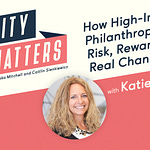“Don’t trap children by asking them rhetorical questions.”
That instruction came from a professional development session for teachers at a charter school network, not from a book about the latest parenting techniques. Not being a classroom teacher, I attended the session out of curiosity. But being a new parent myself, where my most pressing problems dealt with sleep schedules, I tucked away that advice, taught to me by an expert educator, for use at a later time.
Taking lessons from one domain and utilizing them in another is at the heart of “Parallel Entrepreneurship.” This concept, perhaps coined by acclaimed CEO Mark Cleveland, is the topic of the most recent episode of Quality Matters. Mark has led multiple private-sector companies over the years, but he doesn’t affix the label “serial entrepreneur” to his work. “Serial” indicates sequential experiences, and Mark is too active and curious to wait for one idea to complete its life cycle before investigating the next big idea. His pursuits happen simultaneously, which allows him to transpose lessons from, say, the textile industry to a software company.
According to Mark, this method is beneficial in at least two ways:
(1) Faster feedback than more traditional serial entrepreneurship because you don’t need to wait as long to test your ideas. For instance, replicating success in Business A may take a year whereas you could test it in Business B more quickly.
(2) Even negative experiences can be used to your benefit because it might be that your tactic was well-executed but in the wrong context.
Paralleling* in Education Ecosystem
Mark is the son of an educator, and I’d like to think his ideas are just waiting to be scooped up by the broader school community. One immediate parallel that I noticed comes from the proliferation of educational models that go beyond conventional zoned public schools. I am a school choice advocate, and one of the reasons I embrace choice is because I don’t think a single model deserves a monopoly when it comes to educating 60 million children. Over half the children in the country now have access to K-12 choice programs in their states, and if we fold in the idea of parallel entrepreneurship, we might embrace sharing best practices. For instance, a tech-heavy model like Khan Academy need not be at odds with the Montessori method. Both report high degrees of satisfaction and success. So how might they learn from one another? Parallel Entrepreneurship could be a model.
As you might expect from someone interested in pursuing multiple ventures simultaneously, the conversation with Mark was wide-ranging: from socks to solving Nashville’s traffic problem, and many stops in between. I think you’ll appreciate his perspective on taking risks, learning from failure, and being open to the opportunities that will inevitably present themselves.
* Paralleling is a real word, it’s also a real tongue twister.









